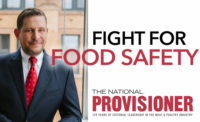The unprecedented global demand for single-use gloves caused by COVID-19 has seen the glove industry flooded with poor and reject quality gloves. Most PPE suppliers and customers were not prepared for the sudden demand increase coming into 2020, so it is important to be thinking ahead for 2021.
The perfect storm of quality issues is appearing, which in turn has food safety implications. Established factories are working at capacity, new glove factories are taking advantage of this situation, and many inexperienced companies and individuals have pivoted into supplying PPE. Before making your next glove purchase, consider the below information.
Not all gloves are food safe
Single-use gloves play an integral role in food safety programs to prevent cross-contamination, while providing the wearer with barrier protection against food, pathogens, chemicals, etc. However, scientific studies implicate glove cross-contamination in 16% of all foodborne illness cases in the US, due to glove type (vinyl) and quality, together with poor glove hygiene processes. Therefore, gloves can be ineffective barriers to pathogens and risks to food safety programs - and this is pre-COVID-19 data.
Moving into 2021, consider how to decrease the 16% foodborne illness statistic by purchasing quality nitrile gloves that have a superior barrier protection to vinyl gloves.
Glove manufacturing and food safety concerns continue to rise
Historically, there are few controls in place for manufacturing processes and factory compliance testing of food handling gloves. This, coupled with the widespread reports of counterfeit and reject quality gloves currently in the market, does little to ensure the prevention of cross-contamination. Traders and brokers are sourcing gloves that in the past would have been rejected, and in some cases have been found to be repackaged used gloves.
When we return to pre-pandemic life, the demand and subsequent prices for gloves will plummet, and globally we will be faced with excess gloves. This may seem like a buyers’ market; however, care must be taken before purchasing cheap gloves without appropriate due diligence as to their quality and barrier effectiveness.
Gloves can be a risk to food safety
Poor quality gloves, or gloves of unknown origin, can be a food safety risk. Glove purchasing decisions made solely on price without assessing quality and source of manufacturing have the potential to threaten food safety programs. Another serious risk factor is pinhole defects. Common in low-quality gloves, these are too small to be noticed by the wearer, but large enough to allow the passage of pathogens to the food being handled.
As we approach 2021, consider the following to avoid the false economy of cheap single-use gloves affecting food safety and increasing business risk:
- Purchase from reputable suppliers with known and documented quality control procedures.
- Be aware of cheap imports which may be reject clearance lines - you may be paying for ripped gloves.
- Purchase only high-quality nitrile gloves.
- Choose disposable gloves that have an AQL (acceptable quality level) of pinhole defects of 2.5 or less. This is essential in determining their level of food safety and barrier protection for the wearer and your customers.
Article written by Steve Ardagh, CEO of Eagle Protect, specialist glove and PPE supplier. Eagle is the world’s only B Corp certified company in their industry, and has implemented a proprietary multi-layered Fingerprint testing program to ensure a range of Eagle gloves adhere to the highest level of food safe performance. Steve can be contacted at steve@eagleprotect.com.




Report Abusive Comment